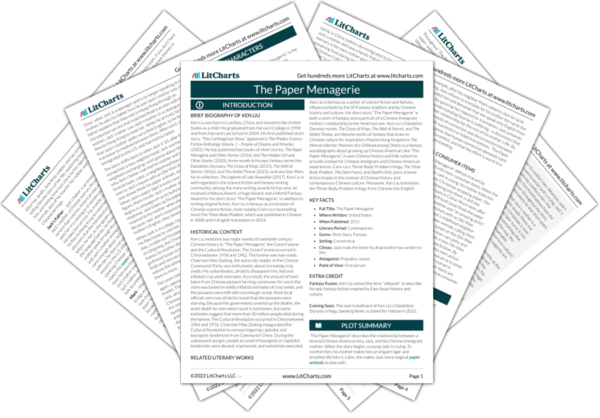Racism and Identity
In “The Paper Menagerie,” a biracial American boy named Jack struggles with—and eventually embraces—his Chinese heritage, showing how his identity can be both a source of discomfort and of joy. When Jack is very young, he and his mother (who immigrated from China) are very close. He seems comfortable with his Chinese identity then, which is particularly apparent in his relationship to the paper animals that his mother makes—animals that she literally brings to life…
read analysis of Racism and IdentityFamilial Love and Estrangement
In “The Paper Menagerie,” familial love is always vulnerable to estrangement or destruction, whether by large historical forces or by more personal failings. Thus, the story suggests that such love is inherently fragile. In a letter to her Chinese American son Jack, Jack’s mother explains how larger forces destroyed her own family in China, before she immigrated to the U.S. Clearly, Jack’s mother did have a family that loved her: her earliest memory is…
read analysis of Familial Love and EstrangementLanguage and Translation
In “The Paper Menagerie,” acts of translation represent the desire for human connection and the attempt to understand other people. Early in the story, Jack asks his American father how he came to marry his Chinese mother. and Jack’s father explains that he met Jack’s mother through an introduction service. Initially, he believed that she spoke English because the introduction service told him so and wrote English letters to him on her behalf. When…
read analysis of Language and Translation
Art vs. Consumer Items
“The Paper Menagerie” defines true art by contrasting it with mere consumer items. When the main character Jack is young, his mother folds him paper animals out of leftover Christmas wrapping paper. She brings the animals to life by blowing into them, a skill she learned from her own mother back in China. Much later, after Jack’s mother has died, Jack’s girlfriend Susan finds the paper animals and declares that Jack’s mother was “an amazing…
read analysis of Art vs. Consumer Items






